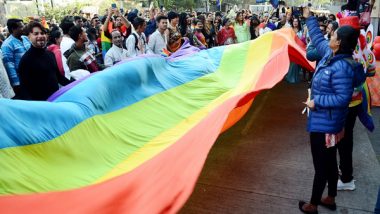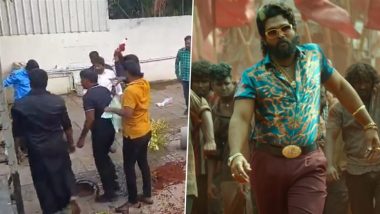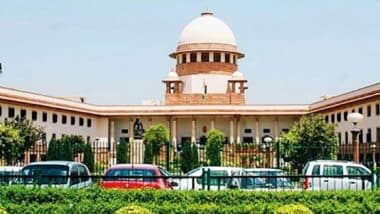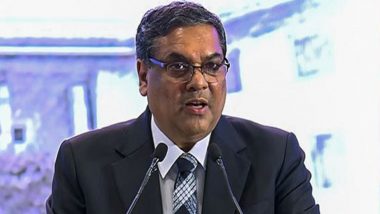New Delhi, April 18: A petitioner on Tuesday argued before the Supreme Court that LGBTQ+ (lesbian, gay, bisexual, transgender and questioning) community should not be stigmatised but assimilated with society by allowing marriage equality.
During the hearing, the court remarked that the present matter shall be restricted to the Special Marriage Act and not interfere with personal laws. Same-Sex Marriage: ‘Will Not Go Into Personal Laws’, Says Supreme Court While Hearing Pleas for Legal Validation.
Senior Advocate Mukul Rohatgi, appearing for one of the petitioners said that the members of the LGBTQ+ shall not be stigmatised and should be assimilated within the society. The assimilation of members of the LGBTQ+ will only happen after state accepts the same-sex marriage, the lawyer argued. Same-Sex Marriage: Supreme Court Agrees To Examine Gay Couple's Plea Seeking Legal Recognition Under Special Marriage Act.
A five-judge Constitution Bench headed by Chief Justice of India (CJI) DY Chandrachud and comprising justices Sanjay Kishan Kaul, Ravindra Bhat, Hima Kohli and P.S. Narasimha was hearing a batch of petitions pertaining to 'marriage equality rights for LGBTQAI+ community'.
Solicitor General (SG) Tushar Mehta submitted that Hindus and Muslims will be affected and stressed that states should be heard while deciding the issue.
SG Mehta said that the legislative intent throughout has been that marriage is between a biological man and a biological woman.
CJI DY Chandrachud remarked that the very notion of a biological man is absolute which is inherent. SG Mehta responded that biological man means biological man and there is no notion. But CJI remarked that there is no such thing as an absolute concept of biological man and woman.
SG Mehta's submission was made while he was stressing SC to hear the first Centre application which raised preliminary issues to the present petitions and said that question pending before the top court Bench is to deal with the creation of a socio-legal relationship of marriage. SG Mehta said that this is in the domain of the legislature.
SG Mehta also submitted that there is no legal lacuna in the transgender act and apprised that there is a clarification that none will discriminate against transgender persons. SG Tushar Mehta said that there are provisions of reservation for transgender
Senior Advocate Mukul Rohatgi, appearing for one of the petitioners, submitted that the top court in various judgements such as Navtej Singh Johar vs Union of India and KS Puttaswamy vs Union of India have already recognised the rights of the members of the LGBTQ+ community.
The petitioner's lawyer urged the top court that the Supreme Court should now provide positive rights by granting the declaration of marriage equality rights to all people including to same-sex couples.
The members of the LGBTQ+ shall not be stigmatised and should be assimilated within society. The assimilation of members of the LGBTQ+ will only happen after state accepts the same-sex marriage, the lawyer argued.
Senior advocate Kapil Sibal, appearing for one of the intervening applicants, raised the question that what will happen to the adopted child or other various things if the marriage breaks down between the same-sex couple. Senior Advocate Kapil Sibal said these issues cannot be done in piecemeal. He pointed out that it is a very complex issue which will have ramifications.
Senior advocate Rohatgi argued about the Roman emperor Nero who married twice, two men, at that time. He also apprised the court about widow remarriage which was earlier not accepted by society.
Countering the Centre's submission, senior advocate Rohatgi said that the choice of an individual is not an "elitist concept" but it is innate and people are born with it like Nero. Senior Advocate Rohatgi said it can not be criminalized but same-sex couples are being stigmatized.
Advocate Rohtagi made further submissions that the rights of people of the LGBTQAI+ community are already envisaged in the Constitution of India as well as by the top Court over time. He submitted that the top Court is not expected to reinvent the wheel, and rather only seeks an affirmative declaration of rights which are already held to be enshrined within the conspectus of the Constitution in a catena of decisions.
Rohatgi urged the Court that it is the conscience keeper of the Constitution of India and it cannot be a defence for the State to contend that the Petitioners should await appropriate legislation by the Parliament on the issue. The matter, which is being heard day-to-day, will continue hearing the matter on Wednesday.
(This is an unedited and auto-generated story from Syndicated News feed, LatestLY Staff may not have modified or edited the content body)




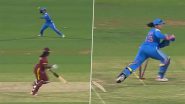








 Quickly
Quickly









